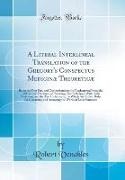Share
Sold out
Robert Venables
A Literal Interlineal Translation of the Gregory's Conspectus Medicinæ Theoreticæ - Being the First Part, and Comprehending the Fundamental Principles and General Doctrines of Physiology and Pathology: With Ordo Verborum, and the Text Underneath; To Whic
English · Hardback
Description
Excerpt from A Literal Interlineal Translation of the Gregory's Conspectus Medicinæ Theoreticæ: Being the First Part, and Comprehending the Fundamental Principles and General Doctrines of Physiology and Pathology: With Ordo Verborum, and the Text Underneath; To Which Are Added, Rules for Construing and Arranging the Words of Latin Sentences
Language is the medium by which men convey their ideas, wishes, commands, &c, to each other. It consists of sentences: sentences of words; words of syllables; and syllables of letters. Words, then, are considered by grammarians as forming what are termed parts of speech. Of these, some are declinable, - that is, they admit of certain inflections, terminations, &c., by which the signification is considerably modified or altered: others admit of little or no variation, and are therefore named indeclinable. The parts of speech in the Latin language are eight; of which, four are declinable, four indeclinable.
Declinable. Indeclinable.
Noun, Adverb,
Pronoun, Preposition,
Verb, Conjunction,
Participle. Interjection.
The construction of a language is the arrangement of the words, with the proper inflections of those which are declinable, so as to convey the meaning of the speaker to the hearer. The arrangement and inflection of words in every language is regulated by rules or principles, named the grammar of such language, and which therefore has been defined "the art of speaking and writing a language correctly." It consists of four parts: Orthography, which is the proper selection and arrangement of letters, so as to form syllables or words; Prosody, the giving to syllables their due sound or intonation, and quantity; Etymology, which teaches the derivation of words from their primitives and radicals, and also the inflections of which they are capable; lastly, Syntax, which comprises the rules for the government of words, by which their mutual relations and dependencies are shewn or inferred.
A word is the expression of an idea, or, as defined by Locke, "the sensible sign of the idea of the speaker." However, we have not a separate and distinct word for every idea. This would render language so extensive as to be not only burthensome, but absolutely useless: there are, therefore, certain primitive or radical significations attached to certain words; but these words are also used to express other ideas, - deductions, as it were, from the original. Hence the significations of words may be reduced to three heads: the primary or radical, the elliptical, and the metaphorical.
About the Publisher
Forgotten Books publishes hundreds of thousands of rare and classic books. Find more at www.forgottenbooks.com
This book is a reproduction of an important historical work. Forgotten Books uses state-of-the-art technology to digitally reconstruct the work, preserving the original format whilst repairing imperfections present in the aged copy. In rare cases, an imperfection in the original, such as a blemish or missing page, may be replicated in our edition. We do, however, repair the vast majority of imperfections successfully; any imperfections that remain are intentionally left to preserve the state of such historical works.
Product details
| Authors | Robert Venables |
| Publisher | Forgotten Books |
| Languages | English |
| Product format | Hardback |
| Released | 01.01.2017 |
| No. of pages | 410 |
| Dimensions | 152 mm x 229 mm x 26 mm |
| Weight | 702 g |
| Subject |
Natural sciences, medicine, IT, technology
> Medicine
> General
|
Customer reviews
No reviews have been written for this item yet. Write the first review and be helpful to other users when they decide on a purchase.
Write a review
Thumbs up or thumbs down? Write your own review.

